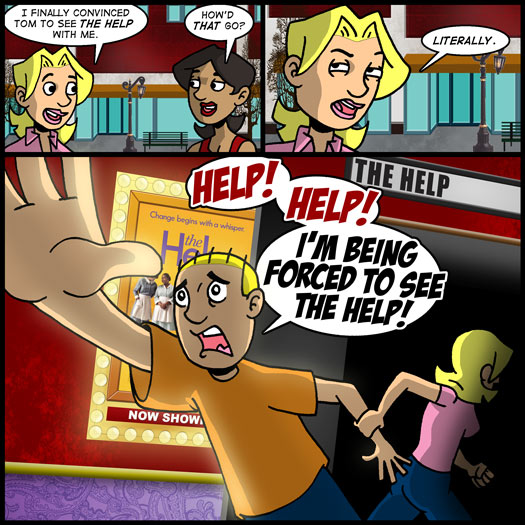Typically, I like to keep Theater Hopper as relevant as possible by tackling what’s current on the movie landscape. So it feels a little bit like I’m putting on loose pants by doing a comic about The Help – a movie that came out over a month ago.
The relevance of The Help has been maintained largely by it’s strong box office. It’s fended off contenders for the top spot for 25 days in a row – the longest streak a movie has stayed at number one since The Sixth Sense held on for 35 days over a decade ago. So, in case you were wondering… yeah, Emma Stone is a for-real movie star now.
“By why now, Tom? Why do a comic about The Help?”
Thanks for asking, imaginary person. The reason is simple. It’s because I went to see The Help this weekend!
The Help is a movie that Cami has wanted to see since before it came out. But, having two kids, we couldn’t find the time to go see it. At one point, Cami exclaimed that she would see it by herself if she had to! Even though I was willing to see The Help with Cami, I encouraged her to see it by herself if she had to because I wasn’t entirely revved up to see it.
Here’s was my opinion about The Help before I saw it – and I have to tread lightly here, because any time I try to make a comment about anything racial, it always seems to get misinterpreted as racist – and that is never my intent.
To me, The Help looked like one of those movies specifically designed to make white people feel good – Emma Stone in the role of a “white savior” helping to liberate black women serving as maids to white families in early 60s Jackson, Mississippi.
It’s basically the flip side of the “magical black man” that Hollywood likes to use from time to time. The black supporting character with particular wisdom or insight that helps the white protagonist. Think about Michael Clarke Duncan in The Green Mile. Or Will Smith in The Legend of Bagger Vance.
I’ll stop there because I don’t want to dig a hole I can’t get out of. But basically what I’m saying is that when I watched the trailers for The Help, I immediately recognized a racially-tinged trope that I wasn’t sure I wanted to support with box office dollars.
Having seen the movie, I can say that I found it to be perfectly acceptable entertainment. I can’t speak to the authenticity of the film or the Civil Rights climate it reflects. I assume some liberties were taken., but nothing stuck out to me.
The film is a little long with side stories about some of the white housewives that I felt distracted from what should have been the main focus of the movie, racial segregation. Jessica Chastain portraying a bubbly blonde none of the other well-to-do housewives want to associate with seemed particularly out of place. Her story line played more like an episode of The Real Housewives of Jackson portraying women with money and their catty backbiting. I’m not sure it did much other than extend the running time of the movie quite needlessly.
That’s not to say Chastain’s performance in the film was bad. She was actually quite good. In fact, I was impressed by the entire cast – and I think that’s where The Help truly shines.
The subject matter may have been glossed over from a historical standpoint, but each of the actors in the film communicate the weight and severity of their reality.
Watching the film, I kept reminding myself that the era this film portrays really wasn’t that long ago – barely 50 years. That’s not very long in terms of undoing the culture of ignorance and the damage it inflicted upon these black women.
In the end, I’m not sure that a movie like The Help was ever intended for someone like me. But I felt like what it may have lacked in substance, it made up for with sincerity. If it gets people talking about race, maybe that’s a good thing.
Have you seen The Help? If so, what was your take? Leave your comments below!
How'd that go?
Literally.
Help!
Help!
I'm being forced to see The Help!







I remember the Sixth Sense being in theaters so long fondly. It was partly my fault it was out in my local place. I wasn’t old enough to see R-rated flicks that summer, but there was always a showing of the Sixth Sense conveniently around the time of some R-rated flick I wanted to see with a friend. It got to be such a habit that I bought tickets for it a couple of times that summer for PG-13 movies too.
Last panel – epic
I concur. That last panel is very epic, and very well done. Kudos Tom.
I’m glad you felt the same way about The Help that I did. I’m not sure it’s possible to make a movie about Jim Crow laws in the 1950s/60s and not have some unintentional racial commentary on it, so I suppose there’s not much the filmmakers could have done differently. But I too felt like the main point of the movie was to make white people feel better about themselves. The audience identifies with the main character Skeeter, who, in “being brave and standing up for rights of the maids” makes the audience feel like they’re doing the strong and brave thing, too. It lets the audience say, “We don’t tolerate racial injustice! We’re proving it by seeing and enjoying this movie about black women standing up for themselves!” (*sigh*)
But even though we’re meant to see her as brave, what Skeeter did was not necessarily courageous. Would SHE have gotten into trouble with the law for talking to the maids? Not nearly as much as the maids would have.
And I felt like in the ending, (SPOILER) with Minnie and Aibileen being supportive of Skeeter’s move to New York and promising that they would take care of each other… it almost turned them into that “magical black person” trope you mentioned earlier. And the truth is, they probably *wouldn’t* have ended up okay. And Aibileen certainly isn’t going to make enough money writing to make up the difference of losing her already-low-paying job as a maid. It all just felt a little too…. neat and tidy for me.
In the end, though, as you said — a perfectly reasonable entertainment. I just wish I felt a little better about it.
“To me, The Help looked like one of those movies specifically designed to make white people feel good – Emma Stone in the role of a “white savior” helping to liberate black women serving as maids to white families in early 60s Jackson, Mississippi.”
I’ve seen this same sentiment expressed elsewhere.
In the New York Times, in my comic, in about a half a million blogs…
It’s because there’s a whole lot of validity to it.
I like what you did with the format! I haven’t seen you use panels that shape or page layout like that before- it’s very effective.
I’ve switched things up a a few times. Sometimes even doing single-panel comics!
I try not to chain myself to the four-panel format. But it’s also a comfortable habit at times.
Oh of course, yeah I didn’t mean to say this is the first time I’ve seen you do an irregular format, just that I like it when you do!
And yes, I am believing more and more in the value of the regular grid- after all, Watchmen was almost all 3×3 grid!
Not so much as a white savior as much as a comforting mirror with which liberal white women can look at their own personal choices in life and feel good. It’s all about how the young are morally superior because they can like see the hypocrisy in your boring middle class lives maaaan.
I’m never going to be arrested, have dogs set upon me or be threatened with bodily harm. But hey! this movie says thats OK. I can join in the great cause by just..writing..gossip.
A modern version of this movie would be called “The Private Jet” because back then only the uber wealthy in the North and South had maids. The “help” for the rest of us was Hoover, Kitchenaide, Frigidaire GE.
As I’ve come to understand the trope of the white savior and the magical black man… the resulting affect is for whites to feel affinity toward black culture without having to know a black person on an individual level. So that kind of speaks to the level of comfort you were talking about.
But you made an excellent point about the movie essentially being about gossip. I hadn’t thought of it like that before.
Good comic Tom, I’m sure we’ve all felt a little bit like that at one film or other. Call me cynical if you will ( I prefer sceptical ) but this film strikes me as the first Oscar bait of the year. This is how I see a year in cinema: there’s the summer tsunami of mostly rubbish blockbusters with a riptide of kids’ films ( mostly Pixar wannabes these days ). As the leaves turn the big budget films with worthy storylines and earnest characters played by Serious Actors like Tim Robbins and Meryl Streep start to pop up, like autumn mushrooms. There’s a few months of this, before the Christmas romcoms and more kiddie films roll in with the inevitable Coke adverts. This is punctuated around Halloween by a short rash of bad horror sequels, and the whole process is padded out with bad comedies, romcoms and Bourne ripoffs. After the Oscar winter kills all this off, there are a few weeks where films which were either so bad they were put back or far enough away from the mainstream get a release, before the cycle starts again. Once in roughly every thirty films something good appears.
Hmmm… this situation seems familiar.
I get what you’re saying about the whole “white savior” aspect of the film – that was an early criticism from even before The Help was released – and I agree with you about the whole Jessica Chastain storyline seeming out of place in the grand scheme of the story. Since it was based on the book, I guess they felt obliged to keep it in, especially when the director is the childhood friend of the book’s author.
Still, is it wrong that I think this is the best movie released so far this year?